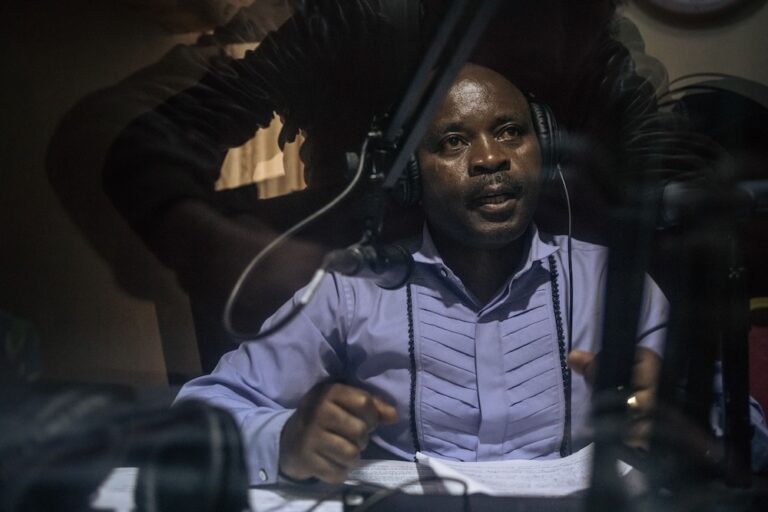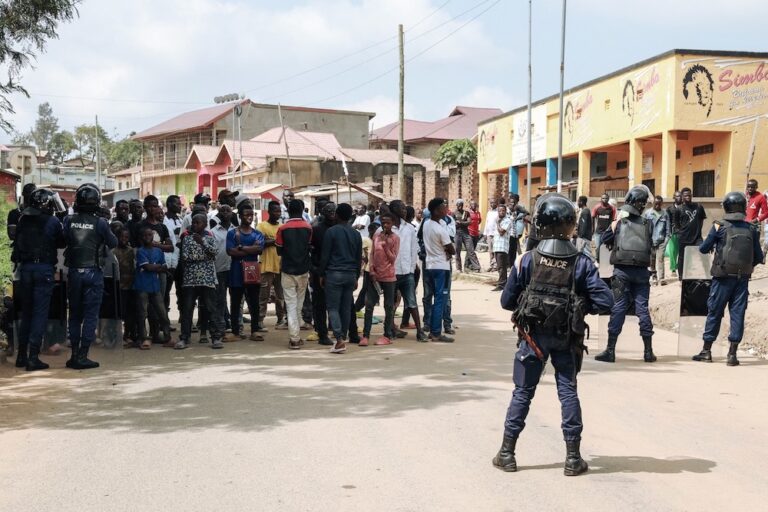There has been a steady decline in the working environment for Congolese journalists and the space for free expression is shrinking.
(JED/RSF/IFEX) – Thirty-one IFEX members express their concern in an open letter to President Joseph Kabila:
President Joseph Kabila
Kinshasa
Democratic Republic of Congo
14 September 2010
Dear President Kabila,
We, the undersigned organisations, would like to draw your attention to the steady decline in the working environment for journalists and the shrinking space for free expression in the Democratic Republic of Congo.
In the last few months, there have been several cases of arrests and threats against media personnel. The foreign media are finding it difficult to conduct their work properly. Nothing has been done to improve the situation in the country and in fact, we have noticed an increase in deliberate attacks on journalists and media in the past two months, attacks that could foreshadow even greater repression in the run-up to next year’s elections if preventive measures are not adopted.
Here are some examples:
1. Michel Tshiyoyo, a cameraman working for Radio Télévision Amazone (RTA), a station based in Kananga, in Kasaï-Occidental province, had to be evacuated to Kinshasa by the UN Stabilisation Mission in Democratic Republic of Congo (MONUSCO) on 17 August after receiving SMS threats from individuals allegedly close to the province’s governor, Trésor Kapuku. His only crime was to have witnessed clashes a few days before between the governor and his men and the population of the village of Lwandanda, 25 km from Kananga. Even after being evacuated, he continued to receive threats, including one warning that “murder is common in Kinshasa”.
2. Pascal Mulunda, editor of the privately-owned weekly “Le Monitor”, was released conditionally on 19 August after spending 24 days in prison and paying US$600 in bail. He was arrested on 27 July and placed in pre-trial detention in Kinshasa prison as a result of a libel action brought by Baudouin Iheta, coordinator of the Small-Scale Mining Technical Assistance and Training Service (SAESSCAM), over a 23 June article accusing Iheta of mismanagement and embezzlement. According to his lawyer, Mulunda must appear before a judge every Tuesday and Friday and is banned from leaving the capital.
3. Jullson Eninga, editor of the daily “Le Journal” was recently released from the Kinshasa Penitentiary and Re-education Centre (CPRK), after spending five months in detention. Initially accused of “making propaganda for the purposes of rebellion”, a crime that does not exist under DRC law, Eninga faced a possible 20-year prison sentence or the death penalty. In September 2009, he published a communiqué by Hutu rebels with the Rwanda Democratic Liberation Forces (FDLR) operating in the eastern DRC. Eninga insisted on his innocence, explaining that the publication of the communiqué was a mistake by the newspaper for which he has formally apologised. “Le Journal” has nonetheless remained closed for the past year at the behest of the communication ministry, which was also behind the prosecution.
4. The transmission signals for Canal Kin Télévision (CKTV), Canal Congo Télévision (CCTV) and Radio Liberté Kinshasa (Ralik) – three opposition stations owned by Jean-Pierre Bemba – were all cut on 26 July. According to reports, a group of armed men stormed into the complex that houses the transmitters and ordered technicians to cut off their broadcasts. No official explanation was given to the three stations, which were able to resume normal broadcasting two days later.
5. On 28 July, soldiers stormed into Moto Oïcha, a radio station based in Oïcha, near Béni (in the eastern province of North Kivu), and asked to speak to the presenter. As he was absent, the soldiers beat the technician who was there, and then searched the building. Fearing for his safety, the presenter has been in hiding ever since. A few days before this incident, the station’s news editor had received anonymous telephone threats.
All these press freedom violations are indicative of the difficulties that Congolese journalists are encountering in the course of trying to work without being exposed to threats and risks. This is the case both in the capital and the provinces, especially the eastern provinces.
We call on your government to:
– Declare a moratorium on imprisoning journalists on charges of defamation or insulting the authorities, so that the media can play their role as a fourth estate in the run-up to the 2011 presidential election and can help combat corruption and attempts at electoral fraud;
– Create the proposed Higher Council for Broadcasting and Communication (CSAC) as soon as possible. By having sole responsibility for regulating the media and empowered to ensure equitable access for all state-owned media, the Council would be able to combat abuses by media, including excessive politicisation during the coming election year.
The need is now more urgent than ever for you to undertake major reforms to promote press freedom in the DRC. Such change would allow you to respond to the current problems as well as to prepare for next year, bearing in mind that the country’s journalists are likely to encounter new problems linked to the campaign for the 2011 presidential election.
We very much hope that you will take these requests into account.
Sincerely,


